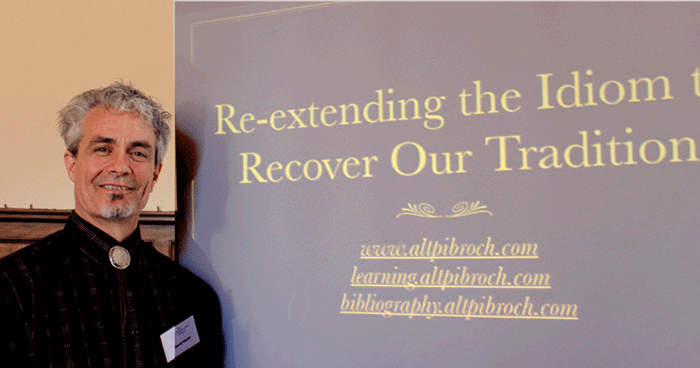
Dr J David Hester, the noted ceol mor student and campaigner, has died. Dr Hester was the inspiration behind the AltPiob website which strove to encourage piobaireachd playing in an alternative style.
A notice on Dr Hester’s Facebook page reads: ‘It is with profound sadness that [we announce] J. David Hester, husband of Mary C Gardella, father of Cassiel and Anael, son of Jim and Dee, brother of Micah, and friend and influencer of so many, died suddenly on Thursday, September 12th.
‘We know how much David is loved and respected, but ask that you provide some time and space for the family to grieve their loss.
‘A celebration of life is planned for October 19th at Cylburn Arboretum Mansion from 4 to 6pm. http://cylburn.org/explore/hours-directions/
‘In lieu of flowers, it was David’s wish that donations be made to Heifer International. https://www.heifer.org/‘
David was invited to give a paper at the Piobaireachd Society Conference in 2016. The then President Dr Jack Taylor said today: ‘David was a warm and passionate campaigner.’
A friend of David’s, Steve Rooklidge of the Shasta Piping Society and the Piping Hour internet radio programme, said: ‘David wanted the big music to be accessable to all, and that passion is a loss.
‘His work on the Alt Pibroch Club was always passionate and a bit controversial, as was his lecture at the PS some time ago, but he was certainly a fighter for the art, and there are precious few of those nowadays. I did an episode of the Piping Hour with his music here: https://kkrn.org/broadcasts/2651.’















Very sad news. I’m a regular user of Altpibroch and his work on it, along with Barnaby Brown, has been a wonderful resource for those of us who are seeking to expand our knowledge and improve our playing of Ceol Mor.
What shocking and profoundly sad news. And what loss. Firstly for his family, but for all of us.
Thanks Robert. David was a fierce campaigner for inclusivity in ceol mor. His work with Allan MacDonald and Barnaby Brown to make early manuscripts available for everyone enhance our understanding of the art. He supported my radio program because he felt the older styles of playing should be shared and evaluated for their time. Above all, he believed in the integrity of the early masters and their ability to express their interpretations through the old manuscripts. Agree with him or not, he could zealously guard against dogmatic restrictions with sharp elbows, but his passion for the music was enormous, and that will be missed most of all by those of us who never shook his hand but fortunately had long conversations and debates with him.